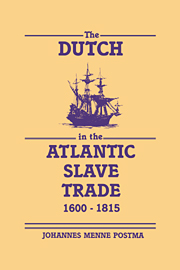Book contents
- Frontmatter
- Contents
- List of tables, figures, and maps
- Preface
- 1 Foundations of the slave traffic, 1600–61
- 2 Curaçao and the asiento trade, 1650–1730
- 3 The Dutch on the West African coast
- 4 Trade and politics on the African coast
- 5 Volume of African exports and origins of slaves
- 6 Organization and mechanics of the trade
- 7 The triangular trade
- 8 The Dutch plantation colonies under WIC monopoly, 1618–1738
- 9 The era of the free trade, 1730–80
- 10 The slaves: their treatment and mortality
- 11 Finances, marketing, and profitability
- 12 The end of the Dutch slave trade, 1781–1815
- Appendixes
- Bibliography
- Index
11 - Finances, marketing, and profitability
Published online by Cambridge University Press: 16 September 2009
- Frontmatter
- Contents
- List of tables, figures, and maps
- Preface
- 1 Foundations of the slave traffic, 1600–61
- 2 Curaçao and the asiento trade, 1650–1730
- 3 The Dutch on the West African coast
- 4 Trade and politics on the African coast
- 5 Volume of African exports and origins of slaves
- 6 Organization and mechanics of the trade
- 7 The triangular trade
- 8 The Dutch plantation colonies under WIC monopoly, 1618–1738
- 9 The era of the free trade, 1730–80
- 10 The slaves: their treatment and mortality
- 11 Finances, marketing, and profitability
- 12 The end of the Dutch slave trade, 1781–1815
- Appendixes
- Bibliography
- Index
Summary
During the past two centuries, the slave trade has come to be equated with gross immorality. However, it is often assumed that those who engaged in it must have had very compelling motives. Racial prejudice is often thought to be the principal motive for slave traders, but it is more likely that racism came to the fore as a consequence of the ever-growing and sharper socioeconomic disparity between blacks and whites that arose out of slavery. A more convincing argument for explaining motives for participation in the traffic is the generous profits that it produced. Slave-trade literature has frequently pointed to specific slaving voyages that were extremely profitable. Only recently has the subject of slave-trade profitability been subjected to a systematic evaluation. But before the profits can be assessed a whole array of related financial factors needs to be explored.
Financial configurations in the traffic
The slave trade was a complex business. Not only because it was unusual in that it dealt with human beings as a commodity, but also because it was stretched over a wide area and involved many different societies and cultural and economic systems. It was therefore quite appropriate that one scholarly study labeled it the uncommon market, even though the slave trade was a very common practice in its time.
- Type
- Chapter
- Information
- The Dutch in the Atlantic Slave Trade, 1600–1815 , pp. 259 - 283Publisher: Cambridge University PressPrint publication year: 1990



